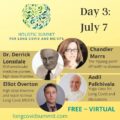Our bodies and brains are capable of incredible things. One of the most fascinating things we’re capable of is perceiving danger before we’re consciously aware of it.
It’s part of the fight or flight response – like jumping out of the way of a bus before we can think to do so.
Unfortunately, our bodies can get this response wrong sometimes.
For example, when our immune systems have been strained for a long time, the mast cells at the frontlines can get exhausted and dysregulated, causing our immune systems to attack indiscriminately. Our body enters “fight” mode for no real reason.
This reaction is called Mast Cell Activation Syndrome (MCAS) and it can make daily life a struggle.
Most people with MCAS see multiple specialists and feel like they’re the only ones dealing with this. But the truth is, up to 17% of the general population is dealing with this health condition! And it doesn’t have to be a mystery any longer.
In my talk at the Reversing Mast Cell Activation and Histamine Intolerance Summit (October 18-25), I discuss how thiamine can help to stop your body from attacking itself and give you the energy to heal.
Some of the topics covered in my talk include:
- The role of thiamine in cellular energy
- Anti-thiamine factors in common foods and medications
- What modern thiamine deficiency looks like
- Thiamine’s role in sensitivities, intolerances, and other reactions
Some of the other speakers will cover:
- The most common causes and underlying triggers of MCAS and histamine intolerance
- How to safely detox from heavy metals, pesticides, and other toxins without triggering a negative reaction
- How to overcome hypersensitivity to food, fragrances, and household products so you can live a “normal” life again
- How to recover from brain fog, cognitive decline, and memory loss that so often accompany MCAS and HI
- The power of epigenetics to turn “off” your hypersensitivity response
- How to reverse chronic GI reactions like IBS and constipation
- Diet and lifestyle factors that make Mast Cells worse (and how to change your diet without causing a hypersensitive response)
- The role of peptides, sauna, PEMF, and more in healing from MCAS and HI
- The impact of the Cell Danger Response and the survival paradox in reversing MCAS
And more!
Get your ticket to the summit here – no charge.
We Need Your Help
More people than ever are reading Hormones Matter, a testament to the need for independent voices in health and medicine. We are not funded and accept limited advertising. Unlike many health sites, we don’t force you to purchase a subscription. We believe health information should be open to all. If you read Hormones Matter, like it, please help support it. Contribute now.
Yes, I would like to support Hormones Matter.
















Good day,
I recently purchased this summit, Reversing Mast Cell Activation syndrome but have not received anything. Please advise how I can access these talks.